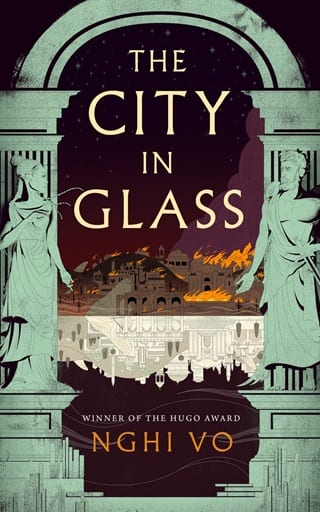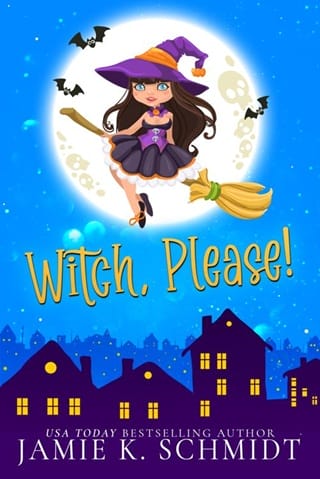Chapter Seventeen
SEVENTEEN
Jinan and Juana left for Mato Lorno when Elena was two years old, and so they were gone when plague appeared in the city eight years later.
It began with one ship carrying a wealth of copper into port, and it spread like fire had through the streets, the richer parts of the city first, and then the poorer, trickling down as fast and as generously as money never did.
From the wall they had built to defend against raiders, Vitrine watched invisible imps racing through the streets, their faces red and ink on their fingertips, marking doors for the ones who would come after them. First the cough, then the fever, then the swelling at the throat and the eyes and the groin. A slow decline and then a fast one, and soon enough, the gravediggers had formed their own guild, fighting with the young Lord Mayor who demanded a grave and a shroud for each death, even against the swelling tide.
Vitrine, who had better eyes than most, saw the scrawny figures of the plague lords walking the streets, finding the doors that had been marked for them. They entered, and they performed their deadly business, and they bowed to the birds that let them in. Vitrine could see that as well, how the illness traveled in the flights of pigeons that were kept in the dovecotes. Pigeon meat was cheap and savory, and their eggs sold by the quarter- and half-hundred count. Their feathers filled mattresses, their dung nourished the gardens, and they passed the illness to their masters who in turn passed it back to them.
She watched grim-eyed and cold as the illness hid in first the pigeons and then the people. Just when it was isolated on one side, it leaped to the other, and within just a few cycles, the dead were piled high in the graveyards, and the gravediggers and the mayor left off their fight.
There could be no dignity for the dead when the living lived so close and in such fear of them, and so they were thrown into the deepest quarries. In the years to come, the old mines would be reckoned haunted, and from the depths would come terrible and ragged cries for help.
Please. We are here. Do not forget us. Do not leave us. We are here.
The living and the dead were matched in this regard, and as the plague stretched out like thread spun from a bale of good wool roving, that was the refrain that was murmured and sung and shouted and cried throughout the city.
We are here. Do not forget us. Do not leave us.
I never will, Vitrine thought with a soft and sorrowful tenderness. Whether you were here short or long, I never will.
The angel found Vitrine sitting on the edge of one of the city wells, dressed in a winding shroud. One end was pulled over her head like a scarf, and she was wrapped down to her ankles, only the tops of her bare feet visible.
“What will you do about this?” he asked. “Or are you a different kind of demon than I supposed?”
“I am no plague lord,” she snapped, “and if you knew anything about cities save the destroying of them, you would know that.”
The angel pointed west to the district they now called Albemarle.
“Four more died in the night,” he said. “Two of them were a couple, and they left behind a baby and one scarce older. None will take them in a time like this, and they will die as surely as if the plague lords had kissed them.”
The angel pointed north, where a number of people from Kailin had come to settle. They raised green and blue lanterns over their beds to turn their faces pale, hoping that Lord Mhai, who ruled over the sea at the end of the river, would think he had already taken them.
“They sing the healing songs there during the day. They sing them so much and so often that the holy meaning has gone out of the words, and they are just noise. That is what the children who survive this will remember, noise and death.”
The angel pointed east, to the docks.
“They will shoot our ships out of the water, those that still have enough crew to sail. There is already talk from Canna and from Seillon that they will barricade us in if we will not do the proper thing and die before we become their death as well.”
“I have heard the talk in Canna and in Seillon,” Vitrine said, gathering her shroud around her more tightly. “They are calling it a judgment. It seems that I have heard that story before, angel.”
“This is your city,” he said. “It’s yours, take care of it.”
“What do you expect a demon to do?” she said, and she let him hear the worn threads in her voice, the places where time and sorrow and wrath had made her what she was.
“Aren’t your kind meant to be more clever than this?” He glared at her, and she thought momentarily of what he would look like trying to breathe out of a whistling hole in his throat.
“At least my kind are more than a mindless scourge!”
“Cruel,” he said, looking up at the houses where the shutters had been daubed with bright blue paint to ward off the illness, and after a moment she realized he wasn’t speaking of her. One of the plague lords, skull-headed, fingers long and many-jointed, prodded at the blue paint speculatively, wondering whether it should be denied. A cooing from inside the house, a brace of racing pigeons bought in better times, made the thing nod its hoary head, and it slipped between the gaps in the shutter like so much smoke.
“If you could fix this, you would have, wouldn’t you?” she asked, and he was silent. “If you could fix this, I would let you go. If you could… speak to someone. One of your brothers, perhaps. Even my siblings who don’t care much for me would—”
“We are not like you,” he said a little angrily. “We no longer speak.”
“Ah.”
“Once they might have, but.”
He shook his head and she wondered at what might have come after, but he turned to the well, gesturing to the winch.
“Will you hold that for me?”
Curiously, she nodded, and as she held the winch steady, he put one foot in the wooden bucket and one hand on the rope.
“All right, now lower me and slowly if you please, without jokes.”
“I do not make jokes, angel,” she said with dignity, but perhaps she found a wry and wicked smile at the idea of consigning an angel to the pit via a series of slow half turns of the winch. Inside her, his wings beat anxiously, and she hummed as the rope jerked back and forth before he called to be lifted up again.
He was muddied when he rose up, soaked up to the knee, but he stepped off the edge of the well, dumping out the pail full to the brim with small drowned animals. No one had been fishing them out, and people would drink bad water before they would go without.
“Is that all you can do?” she asked, shaking her head, and he shrugged angrily, wringing out the hem of his robe.
“My skill set is very limited,” he retorted, just as a flight of pigeons broke cover overhead.
They watched as the flock wheeled over their heads, their wings flashing gray and green and white and pink in the sun, and then disappeared over the city.
“Hmm,” they both said.
The next sunrise saw the dovecotes a place of slaughter. The feathers floated down to produce a soft bloody mat on the ground, and every bird was dead. The cry went up from district to district, echoing and panicked and grieved, and the plague lords took it up as well, a hollow and high-pitched shriek of disappointment.
There were only two pigeons left in Azril, a crowned white and an almandine racer, their bellies heavy with the plague and their eyes as bright as jewels. Vitrine had taken them from the dovecotes of a messenger service, separating them carefully from the flock by virtue of the identifying sigils on their leg bands. She released them from the watchtower, unmanned for half a year now.
The crowned white flew on the west wind to Canna, and the almandine racer made her way down the coast to the tall steeples of Seillon. Vitrine watched them go, pulling her dark red shawl a little more securely over her head. She had pinned it with a delicate iron brooch shaped like a crane in flight.
Cranes suit the city better than pigeons do, anyway, she thought.
They would eat the cranes in the time to come, bereft of squab and the plump layers that put out two eggs every three days until they died. They might eat the mangy cats and dogs as well, and, perhaps if things grew terribly bad, even each other.
However, as she walked back to the city center, the plague lords and their red-faced imps flew over her head, their diaphanous robes blotting out the waning sun and leaving her in momentary chill as they passed by. She lifted her hand to them, for even if they were not her own family, they were likely kin of one sort or another.
She watched until they were out of sight, some gone over the sea, some gone down the coast, and then she made her way into the city, where they had built great fires that stank of burning feathers and tortured meat.
She found the angel sitting next to some of Juana’s cousins, politely holding a mug of beer as the humans fell down drunk around him. Their doublets were covered in down and their hands filthy from the day’s work. In the morning, they would remember that there had been five on their crew, but when they tried to name each one, they would only come up with four.
“Well, they were happy for the extra hands, anyway,” he said. “Though I can’t do much with the beer.”
“A shame for you,” she said, taking it from him and drinking it down with one gulp. She smashed the mug into the fire and lifted one of the drunks into her arms, half carrying him, half dragging him as she whirled around the flame. He pulled away in surprise, but somewhere else close by, the exhaling notes of a set of pipes floated to them, fast and very good. The musicians had had a difficult time. They’d become gravediggers and professional mourners, but soon there would be a day when people would need music more than they needed either.
“Come and I will teach you the ganli,” she said to the men. “I danced it for three dead at Gallowscross and for so many after. You will love it, I promise, and you will want to dance it all the days of your life.”
The men groaned in exhaustion, but one, short and fat, came up to his feet and took her hands in his. She laughed with delight, and she wondered if she had danced with someone like him sometime in the past, caught his face out of the corner of her eye or seen some great-great-great-grandparent succeed or swing. Then it didn’t matter because she was dancing with him now, and he was a good dancer.
She danced with him, and then when she reached for another partner, so did he. They pulled others and others still into their orbit, something like a plague itself, and some drums joined the lonely piper. They thought they danced for death, but Vitrine knew otherwise. They always danced for life, no matter how death lapped their heels.
Vitrine turned and came face-to-face with the angel, standing on the sidelines like the disappointed girl at the party. She looked up at him, not enjoying how much taller he was, and then half haughty, mostly convinced he would refuse, she offered him her hands, palms up. To her surprise, he didn’t hesitate a moment, though he held her hands as gingerly as if they were hollow-boned birds, biting his lip hesitantly.
“Doubting yourself already?”
“Only in that I do not know this dance.” Then, more defiantly, “It is only dancing.”
It was seldom only dancing, but Vitrine did not owe him that explanation. Instead, as the music came around again, she took a step back and the angel took a step forward. Her mind flashed briefly to retreats and pursuits, natural to her kind and to his, but anyway, their roles had never been set in stone. When the music changed, perhaps she would chase him.
“Follow me,” she said, and he did, clumsily at first, and then with enough confidence that she could leave off steering him and simply dance with him. Their shadows were greater than the bonfires could throw, and their feet left tender, shallow hollows on the stones where they stepped. When the rain filled those hollows in the generations to come, they would steam slightly, one of the thousands of small wonders of Azril that would never be remarked or observed.
The crowd unthinkingly made way for them without knowing why they did so, the same way they would resist a riptide or pull back from a hot iron. They recognized Vitrine and the angel in their spines and in the spaces between their shoulder blades and in their skin, and they danced with them like they danced with the threat of drowning or burns.
The steps, it occurred to Vitrine, were not quite the same as the dance she remembered, too fast, a hop where there should have been a pause, and too short, as if there was a bit missing, but she didn’t care. They were dancing the ganli again in Azril, and right in that moment, every pigeon in the city dead, the plague lords gone on to other places, and an angel holding her hands, it was all right.
 Fullepub
Fullepub 



